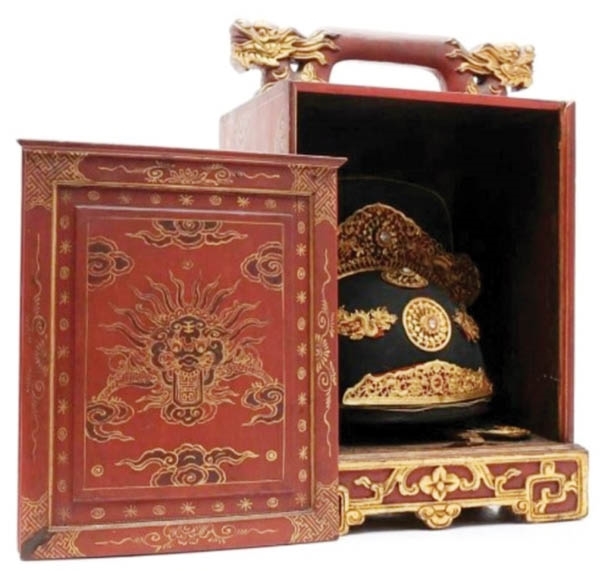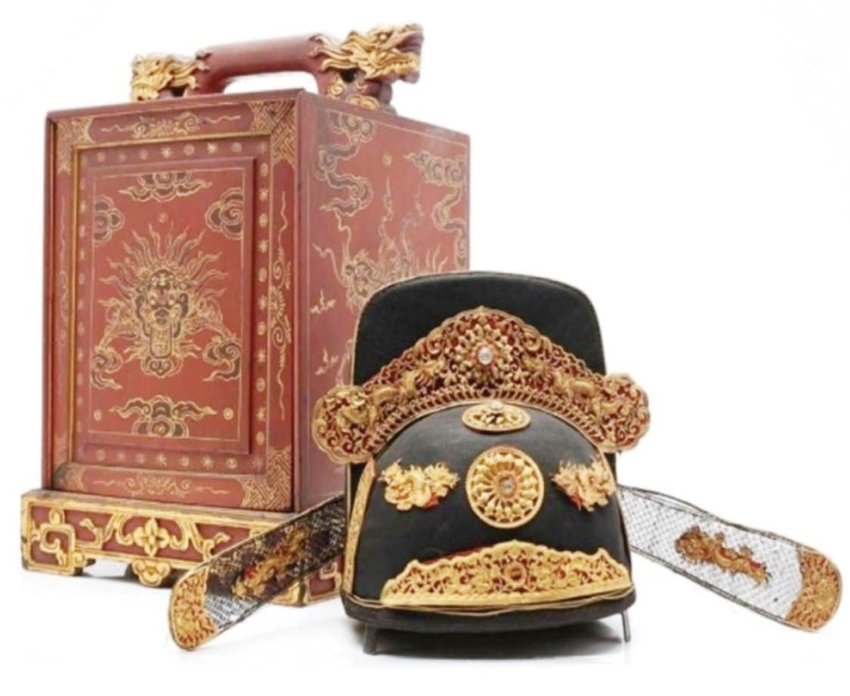 |
The imprint of private sector
As reported by Thua Thien Hue Newspaper, Ms. Truong Thi Thanh Huong, a Vietnamese American of Hue origin, made every effort to buy the precious set of design dossier of Truong Tien Bridge at the auction and successfully brought it back to Hue. That Ms. Truong Thi Thanh Huong won the auction of the design dossier of Truong Tien Bridge and successfully brought it back to Hue for donation once again reflects the fact that: In recent years, a number of Vietnamese antiques have been “repatriated”, but mainly thanks to domestic and foreign private collectors participating in overseas auctions, winning the auctions and bringing the antiquities back to the country.
Typically, in 2010, the antiquity collector Cao Xuan Truong in Hanoi won the auction of a gold-plated silver book conferred by Emperor Thieu Tri on his wife, Ms. Vu Thi Vien, to elevate her from the Third-rank of Royal Concubine (Luong tan) to the First-rank of Royal Concubine (Luong phi) in 1846, for nearly 100,000 USD and successfully brought this book back to its home country.
Or in 2015, Hue Monuments Conservation Center, through an intermediary, won the auction of the 108-year-old rickshaw of Empress Dowager Tu Minh (Mother of Emperor Thanh Thai) organized by Château de Cheverny Auction House (France), with the price of nearly 1,345 billion VND. The rickshaw was brought back to Hue and is currently on display at the Ta Tra building in Dien Tho Palace.
 |
| The Nguyen Dynasty mandarin’s hat successfully bought at the auction and donated to Thua Thien Hue Province by Sunshine Group to serve the goal of preserving and promoting the value of Hue cultural heritage |
In 2021, Sunshine Group Joint Stock Company based in Thua Thien Hue, won the auction of two antiquities organized by Balclis Auction House in Catalan (Spain), including a Nguyen Dynasty mandarin’s hat (dated around the late 19th century - early 20th century) sold for 650,000 euros (excluding taxes and fees) and Nguyen Dynasty Nhat Binh ao dai sold for 160,000 euros (excluding taxes and fees). These two antiquities were donated by Sunshine Group Joint Stock Company to Thua Thien Hue Province and are currently on display at the Hue Museum of Royal Antiquities.
Or in March 2023, two antiquity collectors in Ho Chi Minh City and Hanoi cooperated to win the auction of a golden tea set of the Nguyen Dynasty (dating around Emperor Khai Dinh’s reign) organized by Drouot Auction House in Paris (France), and successfully brought it back to Vietnam. By December 2023, an antiquity collector in Ho Chi Minh City won the auction of Thanh Che Poetry (2nd volumes and 4th volumes) and Thanh Che Literature (1st volume) written by Emperor Minh Mang (1820 - 1841) organized by Drouot in Paris. And most recently, a media sensation, is the case of the “Emperor’s Treasure” golden seal of the Nguyen Dynasty, which was officially repatriated on the morning of November 18th, 2023.
In addition, over the years, many Dong Son bronze items (bronze drums, candlesticks, bronze jars, daggers, etc.), Vietnamese ceramics dating from the Ly - Tran dynasties, commissioned patterned porcelains, paintings of famous Vietnamese artists of the Indochina period, etc., have been repatriated to Vietnam by many private collectors who managed to buy them at the auctions in Paris, London, Amsterdam, New York, Bangkok, Jakarta, etc.
How to “repatriate” more Vietnamese antiquities?
In fact, the antiquities “repatriated” to Vietnam over the years account for a very small proportion compared to the large number of Vietnamese antiquities “lost” abroad in many different ways due to historical incidents, and now are currently displayed in museums and private collections around the world.
According to Dr. Tran Duc Anh Son, former Director of Hue Museum of Royal Antiquities, there are many reasons leading to this situation. The most important of which is that Vietnam does not have a legal corridor allowing organizations and individuals to participate in antiquity auctions abroad. We have had too little information about Vietnamese antiquities abroad, including antiquities for sale at auctions. There is no appropriate policy on the “repatriation of antiquities”. Therefore, it is very difficult to “repatriate” the “lost” Vietnamese cultural heritage.
In order not to be “slow” when buying Vietnamese antiquities abroad and to be able to repatriate such antiquities, the Vietnamese Government needs to have reasonable and open policies.
Specifically, it is necessary to issue legal documents allowing organizations and individuals in Vietnam to participate in antiquity auctions abroad. There needs to be a legal market for buying and selling antiquities in the country, recognized by the State and sponsored by a strict but open legal system. It is necessary to create favorable conditions for famous auction houses such as Sotheby's, Christie's, Butterfield, Nagel Auction, Loudmer, Spink, etc., to invest in the auction market of antiquities and fine arts in Vietnam.
Public museums should have experts specializing in collecting information about buying, selling and auctioning Vietnamese antiques abroad to quickly get the necessary information. Thence, the museum can plan and propose to the competent authorities to fund the purchase of these antiques. Finally, the State needs to have appropriate policies to encourage the “repatriation” of antiquities (not just Vietnamese antiquities) from abroad, just as the way Ms. Truong Thi Thanh Huong won the auction of the design dossier of Truong Tien Bridge, which is also a popular approach of the Korean and Japanese Governments.
“To my knowledge, many Vietnamese expatriates currently own precious collections of Vietnamese antiquities. Although they want to “repatriate” these antiquities, they still hesitate to do so because they do not know about the Vietnamese State’s policy on the “repatriated” antiquities,” said Dr. Tran Duc Anh Son.
Photos: Hue Museum of Royal Antiquities
